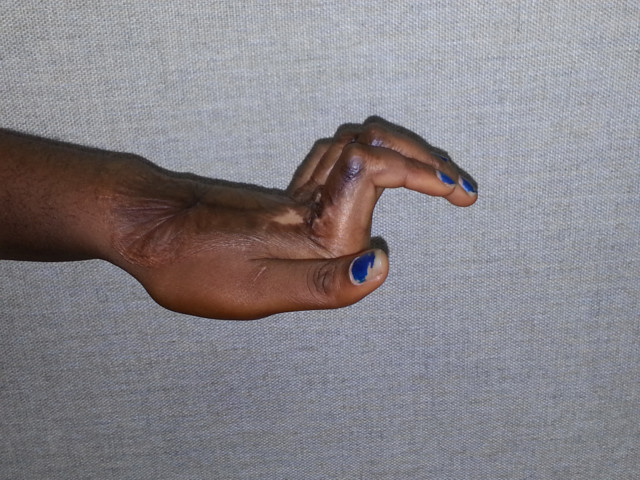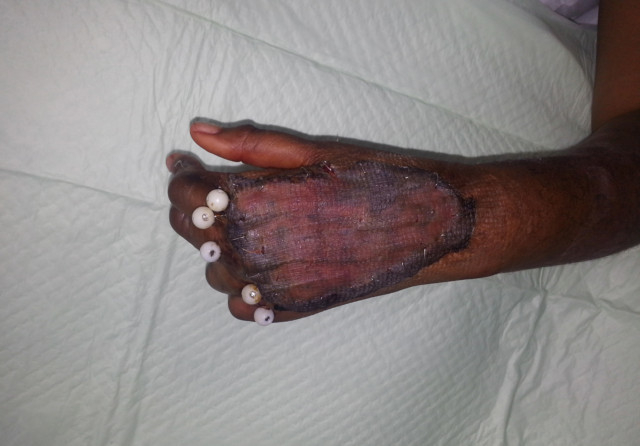Dubai: A young woman who was left with a virtually useless left hand after a road accident four years ago is now able to hold a cup after undergoing pioneering surgery in Dubai.
An artificial skin graft called Matriderm was used for the first time to reconstruct the layers of her badly-damaged hand. Plastic surgeon and specialist reconstructive hand surgeon, Dr Mohan Rangaswamy, carried out the operation on the 20-year-old Nigerian patient, Christobel Ugbaja, a fortnight ago.
Christobel Ugbaja’s left hand before the surgery.
Ugbaja was unable to bend her left hand backwards and could not make a her fist or grip anything with it.
“This patient was ideal for the tissue-engineered dermal constructs (tEdc) called Matriderm graft," Dr Rangaswamy said.
"There was a dense scar on the back of her hand and the fingers were pulled up and the knuckles bent backwards. I was sure that it could be corrected but anticipated that the tendons might be laid bare after full release of the contracture.
"Such cases usually need a flap surgery [where a flap is taken from another part of the body] this operation is lengthy and can be in two stages, have a long recovery and also be more expensive. The patient was on a short visa and was not keen on flap surgery and a longer stay.”
Christobel's hand seven days after the surgery graft was taken.
Rapid recovery
The procedure was carried out at the Medcare Orthopaedics and Spine Hospital (MOSH) in Dubai. During the surgery, the contracture was released, Ugbaja’s fingers were brought into a more normal position and fixed with pins.
The wound and tendons were covered with Matriderm and then she underwent a skin graft.
She was discharged the next day after surgery with a custom-made orthotic splint on her bandaged hand and was able to travel to Nigeria, where she is currently undergoing physiotherapy and splint therapy.
Christobel can now bend her hand backwards, make a fist or grip small items with it.
“I am more than satisfied with this surgery. Although there is pain, I have been able to get back the grip in my hand and after four years have been able to hold a cup in my hand,” Ugbaja told Gulf News.
Her surgeon is positive that Ugbaja will be able to regain the full use of her hand within a month.
This technology, according to Dr Rangaswamym, has the potential to be a major breakthrough in tissue coverage and adds one more option to a plastic surgeon’s reconstructive apparatus.
“The surgeon can be more aggressive in removing dead tissue in burns and injuries, knowing that he can use this material for primary coverage. This, in turn, has the potential for rapid recovery and earlier return to function. It could also find applications in skin cancer and reconstructive surgery of the face,” he said.
However, the cost could be a prohibitive factor. An A4 sheet of Matriderm currently costs anywhere between Dh9,500 to Dh10,000, which might be too expensive for larger surface grafts.














